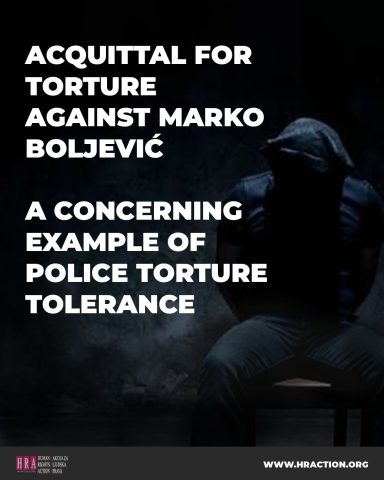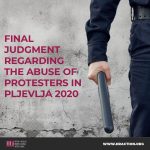
TO MINISTER GRLIĆ-RADMAN: THE CRIMES IN LORA HAVE NOT BEEN FULLY PROSECUTED
17/03/2025CONSTITUTIONAL COURT OVERTURNS HIGH COURT RULING ON ILL-TREATMENT IN PRISON, CITING SUSPENDED SENTENCES FOR TORTURE
21/03/2025ACQUITTAL FOR TORTURE AGAINST MARKO BOLJEVIĆ – A CONCERNING EXAMPLE OF POLICE TORTURE TOLERANCE

The acquittal of five police inspectors accused of extorting testimony through severe violence against Marko Boljević at the Podgorica police station, by the Basic Court in Podgorica, demonstrates a deeply concerning approach to prosecuting torture. In this case, the critical focus has been placed solely on the victim, while the testimonies of state officials, even those whose colleagues have been accused, are accepted uncritically. Such an approach by the court to police torture encourages abusers and intimidates victims from reporting torture.
We expect that this first-instance ruling will be reviewed on appeal based on international standards for prosecuting torture claims, as this is a duty of Montenegro under its Constitution and international agreements, and is crucial for fulfilling obligations in the European Union accession process.
This case is particularly important because it involved the extortion of a confession for the fraudulent prosecution of a bombing at the home of a security official, Duško Golubović, and a café called Grand. Since this plot was foiled—because the extortion of testimony was reported, and other evidence disabled the operation—both bombing cases remain unsolved to this day.
What has been clarified is that based on the extorted and inaccurate testimony of Marko Boljević, who was tortured, an attempt was made to shift the blame to those who did not plant the explosives (Jovan Grujičić and Benjamin Mugoša).
Now, nearly five years after Marko Boljević was tortured in May 2020 at the Podgorica Security Center and forced to give an inaccurate testimony, no police officer has been convicted for the torture.
Judge Larisa Mijušković-Stamatović, who delivered the first-instance verdict after two years of trial, criticized the victim, Boljević, for not reporting the torture on the same evening but “only the next day,” invoking the violation of the “timeliness principle” on the victim’s side, which is not recognized in international torture prosecution practice.
The conclusion that police torture was not proven in the first-instance ruling is based on the following questionable reasoning:
- The expert report, stating that injuries matching the description of the reported abuse could have occurred within 72 hours, leaves open the possibility that they could have happened in another incident and not during the entire day of “treatment” in the police station;
- The injuries, which were not on the head but behind the neck and under clothing, should have been visible to State Prosecutor Ivana Vuksanović, who questioned Boljević and testified in court that she did not notice them;
- The same injuries should have been noticed by the colleagues of the accused police officers, polygraph experts, who testified that they did not see them.
Domestic forensic experts and the University of Montenegro’s forensic-medical panel found that the injuries on Marko Boljević’s body correspond to his statement of having endured torture. They concluded that the injuries were the result of at least 11 blows with fists, feet, so-called “volleys,” and blunt mechanical instruments. Three world-renowned experts reviewed Boljević’s examination and made a special expert report, confirming “with a high degree of certainty” that the recorded injury marks matched the reported torture. This report was rejected by Judge Mijušković-Stamatović because it was not based on a domestic court or prosecution order, which would contain clear instructions on what to examine.
We expect that, upon appeal, the Higher Court will ensure this verdict is critically and impartially reviewed, with a clear understanding of the international standard prohibiting torture.







 English
English